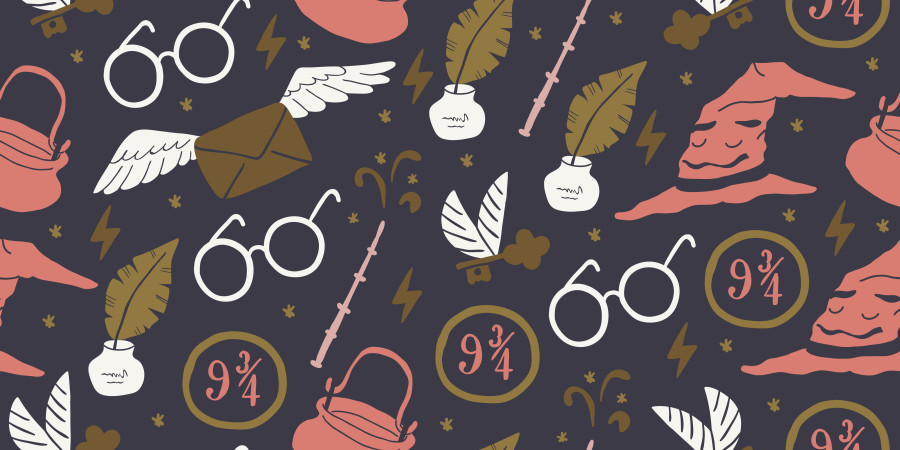Books
Reading Harry Potter in my mid-twenties (while under lockdown)
Flawed as they may be, the seven books helped me escape the horrors of reality and entrusted me with hope—that I, too, might apply myself to what I think is both therapeutic and rewarding: writing.
Bibek Adhikari
The interminable lockdown days did one good thing for me. It helped me cast off my age-old literary pretensions and do something I’ve always wanted to do: read JK Rowling’s Harry Potter series. The first thing that came to my mind as I picked up The Sorcerer’s Stone (or The Philosopher’s Stone) was—am I not too old for this? But as I kept reading, I got so engrossed in the narrative, my mind taking elaborate flights of fancy, that I hardly noticed time’s passing.
One book led to another, and within the next two months, I was reading the last page of The Deathly Hallows, half-expecting that the story wouldn’t end this soon. To gratify my tender wistfulness for the characters, I picked up the stage play, The Cursed Child, and got largely disappointed. The play—merely a bland afterthought—left a bad taste in my mouth.
So what did I learn by eschewing my literary snobbery and plunging into a heart-warming tale of three Hogwarts’ students and their struggles in the magical world? It helped me tolerate the restless and tortuous lockdown days for sure. Without losing myself in the beauty of the Potter world, lockdown wouldn’t have been possible to endure. Also, I learned a few things about friendship and bravery—and how one should cherish them as priceless gifts.
The Potter books have their strengths and their flaws. And, for someone who grew up reading and adoring literary fiction, the flaws were too pronounced at times. Yet, like many Potter-heads, I was forgiving. Absorbed as I was in reading, I put my inner critic in cold storage for weeks, but it somehow resurfaced later. I was caught between the two extremes: the subtle beauty and the profound flaws. But first, the positive qualities.
The primary aim of these novels is to help readers escape humdrum reality. Once you are engulfed in the narrative, there’s no way out. One page inevitably leads to another, vehemently grabbing your attention. The series is a real page-turner. And after spending endless hours, skipping meals, and sabotaging your sleep-wake routine, you’ll read the last two sentences: “The scar had not pained Harry for 19 years. All was well.” Here, you sigh and maybe shed a tear or two.
Another enjoyable thing is Rowling’s fluid and succulent language. The snappy prose as well as the long-winded description pulls you in, and you swing between the real and the magical. Pure and unadorned British humour greatly pleases: Fred and George, the lovable Weasley twins, are full of wisecrackers and smutty puns; Uncle Vernon is an unforgettable character: his wry humour and hilarious mannerisms delight and enchant.
Yet you finish the books, keep them safely in your ‘favourites’ shelf, and wonder: what did I really gain?
Nothing except the 62 (that is if you read at the speed of 250 words per minute) hours of pure escapism, not to mention the surge of serotonin in your brain, making you feel happy and level-headed. And once the chemical charm wears off—maybe in some months or a year—you cannot help but contemplate.
Why is it that we are so into the story of the ‘chosen one’ who bounces through a series of interconnected but equally unbelievable events and saves the day in the end? This trope has become more of a universal narrative in the mold of Joseph Campbell’s theory on The Hero’s Journey. There’s a tremendous amount of character growth, and the stakes are deliberately set high. The average teenagers turn into extraordinary heroes—and readers also make an empathic connection with them.
From being a meek and mousy boy to growing into an exceptional wizard of his time, Harry’s character arc goes through many stages which transform him gradually. The other two protagonists, Hermione and Ron, too grow, but their growth is meant to act as a foil to Harry’s. Some static characters like Hagrid or Dumbledore never grow, while Lord Voldemort (oops, He-Who-Must-Not-Be-Named), the Dark Wizard born out of a love potion and incapable of loving anyone, appears evil for the sake of being evil. And Snape, whose growth doesn’t matter as the revelation comes too late in the novel, is full of spite and takes sadistic pleasure in torturing Harry.
The magical world of Hogwarts, much to my dismay, didn’t feel fully developed. Only in The Goblet of Fire do readers get to know about other magical schools, while in the rest of the books Hogwarts dominates the magical world. This idea of one-school-dominion has its roots in British imperialism. Hogwarts, or the underbelly of London, reigns over the world as much as it even controls the muggle (or the non-magical) ministry.
Another blip is this: since the magical and the muggle worlds are so disjointed and the wizards are ever powerful, I sometimes wondered why You-Know-Who didn’t just take over the entire world. What was the point of being so clandestine and operating in utter secrecy when the muggles were helpless and easily trampled upon?
The spells (or ‘the silly incantations’ as Professor Snape would say) are all over the place. Rather than having a certain hierarchy and power in their uses and abuses, many of the spells in the Potter world—a bunch of Latin and English phrases slapped together to sound sophisticated—do nothing but repair broken glasses or stop the nose from bleeding more. Also, the bad guys (the so-called Death Eaters) do nothing but shoot jets of green lights—which only comes from the killing curse, the blasted Avada Kedavra—all the time, come what may.
Perhaps I was looking at the wrong places, or perhaps it was the author’s lack of ingenuity that was so irate and insouciant, that I soon got bored with all these ‘silly incantations’ coming out of nowhere. The obvious lack of logic is childish … then again what more should one expect from a series whose primary purpose is to help children pass or kill their time?
How about the magical creatures, then? First off, Dobby, the poor elf who we love so much, is a symbolic representation of British colonialism. The idea might sound ludicrous, but it so happens to be true. House elves love to be enslaved, and in return, they don’t even want a penny. When beaten and bruised by their masters, they take masochistic pleasure. That rings a bell and reminds the readers of the eighteenth-century colonisation and slavery.
Many of the fantastic beasts, like Aragog (the giant spider), Norbert (Hagrid’s pet dragon), or Fluffy (the three-headed dog), have no agency at all. They are in the narrative to serve the wizarding kind as mere plot devices. For a fantasy series, this cheap trick should’ve been avoided.
Even though the American literary critic Harold Bloom called Harry Potter “slop” and “garbage” in his interviews, judging the entire series with such disparaging remarks wouldn’t be prudent. Also, being a blind follower and supporting the fandom with near-lunacy is detrimental for the objective analysis of any literary text. Readers should look for a middle way—one that is just and impersonal.
For all it is, and isn't, had it not been for Harry Potter, the lockdown would’ve taken a toll on my sanity. For keeping me afloat through the hard times, I owe an enormous debt to Rowling’s magical and engaging prose. Flawed as they may be, these seven volumes helped me escape the horrors of reality and entrusted me with hope—that I, too, might apply myself to what I think is both therapeutic and rewarding: writing.




 11.84°C Kathmandu
11.84°C Kathmandu










